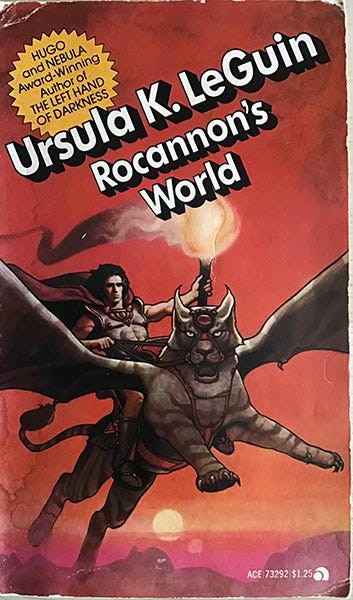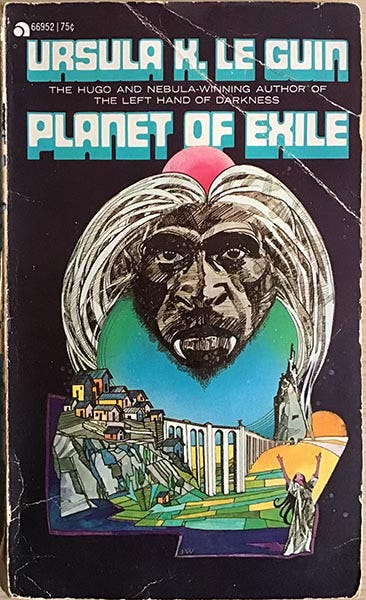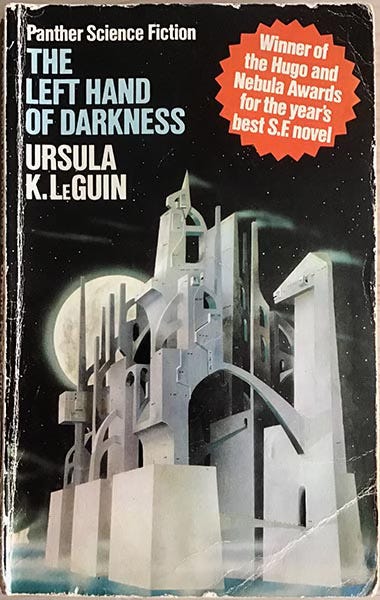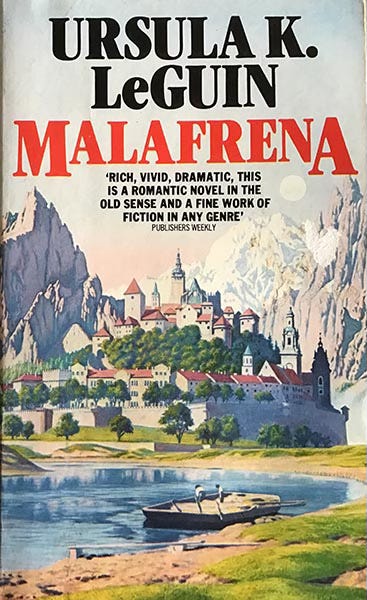“There have been great societies that did not use the wheel, but there have been no societies that did not tell stories.” ― Ursula K. Le Guin
The first of Ursula K. Le Guin’s novels I ever read, fittingly enough, was her first, Rocannon’s World. I guess I was about seventeen, but not too young and callow to realise that I’d found a very special writer. I’d loved science fiction for years, but I don’t think it had ever before given me prose of such beauty, subtlety, and precision.
I say 'science fiction', but Rocannon’s World wasn’t like any SF I’d read. There were spaceships in it, and other bits of advanced tech, but for much of the story these were nowhere to be seen, and the ambience was closer to fantasy, with swords, castles, and flying steeds.
Perhaps I was briefly disconcerted by this blurring of genre boundaries, but the quality of the writing pulled me through; and I think now it was a valuable lesson. And as Le Guin herself once said, 'Genre, a concept which could have served as a useful distinction of various kinds of fiction, has been degraded into a disguise for mere value-judgment. The various 'genres' are now mainly commercial product-labels to make life easy for lazy readers, lazy critics, and the Sales Departments of publishers.'
I’ve butted up against this in my own publishing efforts, since The Shattered Moon series does not fit conveniently into any 'standard' genre framework. I’ve shared a few thoughts on my blog and I want to develop this further some time soon, but that would take me a long way from my main purpose here, which is to explore Le Guin’s importance for me. However, there’s no doubt in my mind that Rocannon’s World planted a seed which has—eventually—borne fruit.
Having enjoyed it so much, I went looking for more Le Guin, and my next discovery was Planet of Exile. There’s arguably even less advanced tech in this than in Rocannon’s World. The planet, Werel, is populated by native humanoids in uneasy coexistence with the 'farborns' who arrived generations earlier as colonists. The two communities are eventually obliged to cooperate and the farborns must learn to accept the permanence of their 'exile'. Cultural arrogance and incomprehension are eroded by necessity, and the focus of the story lies here, not in technology.
Those two books alone would have made Le Guin a favourite author, one I would read and reread frequently, but it didn’t end there. Then I read The Left Hand of Darkness and I’ve never been the same. And I’m not alone: Becky Chambers, author of the excellent Wayfarers series, has testified to its impact on her, while Neil Gaiman says this: "Reading The Left Hand of Darkness when I was eleven years old changed everything for me."
LHOD was groundbreaking SF, most of all for its consideration of gender. In contemporary literature, non-binary, gender-fluid, and trans characters are no longer a novelty. Over 50 years ago, things were a little different. Le Guin has subsequently been criticised for making her protagonist, Genry, male, but it has to be looked at against other SF of the time. When I reread Asimov’s Foundation trilogy, for example, a few years ago, I was both shocked by the virtual invisibility of women, especially in the first volume, and shamed to realise that I had scarcely registered this fact when I read it in the 1970s.
Much has been written about the way LHOD plays with gender roles through the Gethenian people, who are both asexual and genderless, except in their intervals of kemmer (it's no real spoiler to mention this: it's revealed in the first few pages). This is a central and vital element of the book, and certainly one that had an impact on me, but it appealed on other levels too. It nailed, once and for all, the myth that SF doesn't do character; it focused once again on social and cultural themes rather than technological ones; and it offered some wonderful descriptions of landscape and outdoor experience, guaranteed to resonate with me.
I’ve read it many times since, and I still find joy in it every time. I also recently discovered the excellent BBC audio adaptation, starring Kobna Holdbrook-Smith. There’s also a fine BBC interview from the same year, 2015.
I could say a great deal more about LHOD, and if you have any thoughts about it, feel free to leave a comment, but I need to leave space to mention a few more of Le Guin’s books.. I can hardly do justice to every title, but The Dispossessed is another that’s too good to ignore, its gritty anarchist utopia opening my eyes to new strains of political thinking. I also have a fondness for the novella The Eye of the Heron.
However, I need to give particular consideration to one more novel, and a series.
The novel is Malafrena. There's something about it that makes it one of the most often-read books on my shelves. In fact my original paperback copy fell apart and I had to track down a replacement; it seemed strangely important to find the same edition if I could (I did).
It's not SF or fantasy, but a historical novel, set in the early 19th century. The setting is the imagined Central European state of Orsinia, which I've always thought of as somewhere in the region of modern-day Czechia, Slovakia, and Slovenia. I'm fortunate to have visited all three countries, and I now get jumbled images of Prague and Bratislava for the city of Krasnoy and the glorious Julian Alps for the mountains around Val Malafrena. But I loved the book long before I'd been to any of them—which was more problematic when I was young as they were all behind the Iron Curtain.
Malafrena is not solely a political novel, but it is deeply concerned with politics, and you can trace themes of freedom and repression which recur in many of Le Guin's other works, notably The Dispossessed, and the Werelian story/novella sequence. Being Le Guin, of course, there is a lot more to it. Above all it's the story of one young man, Itale Sorde, whose youthful idealism is sorely tested. I think I related to the idealism if not the testing, but it's full of memorable and richly-drawn characters, notably Itale's sister Laura and their friend Piera. If you're like I was the first time, you're going to wonder from early on whether Itale and Piera will ever get together; that’s one spoiler I’m not dishing up. Read the book, it's bloody marvellous.
And… I sometimes think that what I am doing with The Shattered Moon series is like mixing up Malafrena with The Left Hand of Darkness. Or at least trying to.
Finally, of course, there’s the Earthsea series. Though marketed as a children’s book (perhaps Young Adult in modern terms), it’s immensely satisfying for adult readers—certainly for this one. And I can’t resist observing that A Wizard of Earthsea sent its protagonist to wizarding school almost thirty years before Harry Potter and the Philosopher's Stone. I’ve loved the series since I first encountered it (with a special place for The Tombs of Atuan), but I found an extra dimension when my partner gave me the collected Books of Earthsea for my last birthday. The illustrations (by Charles Vess) were a grand addition, but I found my greatest delight in the author’s Introduction and her afterwords to each of the individual novels.
I was struck by Le Guin’s observation in the Introduction, “None of them was closely plotted or planned before writing; in each of them much of the story came to me as I followed what I wrote where it inevitably led.” It’s hard to express how heartening this was for me, and how often I’ve quoted it to challenge those pundits who declare that novels should be exhaustively planned. It helped to inspire a blog post, and I may reprise this subject soon.
How to sum up? Let’s just say this, if I was ever on Desert Island Discs and got to the point where to name one book, out of all the world’s literature, that I would take with me to my island… would it be The Left Hand of Darkness, or would it be Malafrena? I hope I’m never asked (a pretty safe bet!), because I think it would break my heart.
“Only in silence the word, "Only in dark the light, "Only in dying life: "Bright the hawk's flight "On the empty sky." The Creation of Éa ― Ursula K. Le Guin








